| Listing 1 - 5 of 5 |
Sort by
|
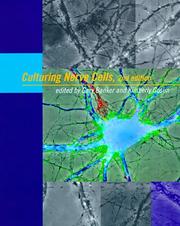
ISBN: 0262024381 0262267675 0585247528 9780585247526 9780262024389 Year: 1998 Publisher: [Place of publication not identified] MIT Press
Abstract | Keywords | Export | Availability | Bookmark
 Loading...
Loading...Choose an application
- Reference Manager
- EndNote
- RefWorks (Direct export to RefWorks)
Animal psychology and neurophysiology --- Zoohistology. Zoocytology --- Nerve tissue --- Neurons --- Cultures and culture media --- Laboratory manuals. --- Nervous System --- Clinical Laboratory Techniques --- Investigative Techniques --- Analytical, Diagnostic and Therapeutic Techniques and Equipment --- Culture Techniques --- Nerve Cells --- Cell, Nerve --- Cells, Nerve --- Nerve Cell --- Neuron --- Culture Technique --- Technique, Culture --- Techniques, Culture --- Investigative Technics --- Investigative Technic --- Investigative Technique --- Technic, Investigative --- Technics, Investigative --- Technique, Investigative --- Techniques, Investigative --- Diagnoses and Laboratory Examinations --- Diagnosis, Laboratory --- Laboratory Diagnosis --- Laboratory Examinations and Diagnoses --- Laboratory Techniques, Clinical --- Clinical Laboratory Technique --- Diagnoses, Laboratory --- Laboratory Diagnoses --- Laboratory Technique, Clinical --- Technique, Clinical Laboratory --- Techniques, Clinical Laboratory --- Nervous Systems --- System, Nervous --- Systems, Nervous --- Cells --- Anatomy --- Cells, Cultured --- Human Anatomy & Physiology --- Health & Biological Sciences --- Neuroscience --- Cultured Cells --- Cell, Cultured --- Cultured Cell --- Organ Culture Techniques --- Coculture Techniques --- Cell Culture Techniques --- Human Umbilical Vein Endothelial Cells --- Diffusion Chambers, Culture --- Anatomies --- Clinical Laboratory Diagnoses --- Clinical Laboratory Testings --- Clinical Laboratory Tests --- Clinical Laboratory Test --- Clinical Laboratory Testing --- Diagnose, Clinical Laboratory --- Laboratory Test, Clinical --- Laboratory Testing, Clinical --- Test, Clinical Laboratory --- Testing, Clinical Laboratory --- Laboratories --- Medical Laboratory Science --- Clinical Laboratory Services --- Cell --- Cell Biology --- Growth --- Nerve cells --- Neurocytes --- Nervous system --- Nervous tissue --- Neural tissue --- Tissues --- Cultures and culture media&delete& --- Laboratory manuals --- Growth&delete&
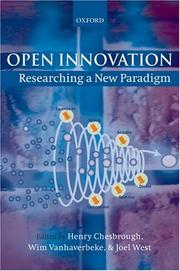
ISBN: 0199290725 9780199290727 9786611154813 0191537438 1281154814 1435609328 6611154817 9780191537431 9781281154811 9781435609327 9780199226467 0199226466 1383043701 Year: 2023 Publisher: Oxford : Oxford University Press,
Abstract | Keywords | Export | Availability | Bookmark
 Loading...
Loading...Choose an application
- Reference Manager
- EndNote
- RefWorks (Direct export to RefWorks)
In this work, the authors investigate the phenomenon of 'open innovation', in which firms draw on research and development outside their boundaries. It links the practice of innovation to the established body of innovation research, showing what's new and what's familiar in the process.
Business policy --- 001.895 --- Vernieuwingen. Innovaties --- Diffusion of innovations. --- Research, Industrial. --- Technological innovations. --- Technological innovations --- Research, Industrial --- Diffusion of innovations --- Management --- Business & Economics --- Management Styles & Communication --- Innovation --- Management. --- Innovation. --- 001.895 Vernieuwingen. Innovaties --- Innovations, Diffusion of --- Acculturation --- Communication --- Culture diffusion --- E-books --- AA / International- internationaal --- 338.043 --- 338.6 --- Innovatie ; ondernemingen --- Technologische vooruitgang. Automatisering. Computers. Werkgelegenheid en informatica --- Wetenschappelijk onderzoek en ontwikkeling
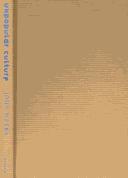
ISBN: 0226878112 0226878120 Year: 2004 Publisher: Chicago (Ill.) University of Chicago Press
Abstract | Keywords | Export | Availability | Bookmark
 Loading...
Loading...Choose an application
- Reference Manager
- EndNote
- RefWorks (Direct export to RefWorks)
When you start a new job, you learn how things are done in the company, and you learn how they are complained about too. 'Unpopular Culture' considers why people complain about their work culture and what impact those complaints have on their organizations. John Weeks based his study on long-term observations of the British Armstrong Bank in the United Kingdom. Not one person at this organization, he found, from the CEO down to the junior clerks, had anything good to say about its corporate culture. And yet, despite all the griping--and despite high-profile efforts at culture change--the way things were done never seemed fundamentally to alter. The organization was restructured, jobs redefined, and processes redesigned, but the complaining remained the same. As Weeks demonstrates, this is because the everyday standards of behavior that regulate complaints curtail their effectiveness. Embarrass someone by complaining in a way that is too public or too pointed, and you will find your social standing diminished. Complain too loudly or too long, and your coworkers might see you as contrary. On the other hand, complain too little and you may be seen as too stiff or just too strange to be trusted. The rituals of complaint, Weeks shows, have powerful social functions.
Business anthropology --- Corporate culture --- Employee morale --- #SBIB:309H251 --- #SBIB:316.334.2A500 --- #SBIB:316.334.2A553 --- #SBIB:39A4 --- Industrial morale --- Morale, Employee --- Morale --- Personnel management --- Psychology, Industrial --- Business --- Corporate anthropology --- Industrial anthropology --- Management anthropology --- Private sector anthropology --- Public sector anthropology --- Anthropology --- Interne communicatie en organisatie --- Organisatiesociologie: algemeen --- Personeelsbeleid en loonbeleid, functieclassificaties --- Toegepaste antropologie --- Anthropological aspects
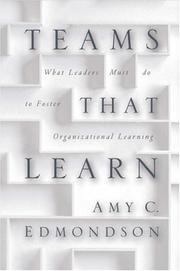
ISBN: 9780787970932 9781118216743 9781118216767 9781118216774 1118216776 1118216741 1118216768 078797093X 9786613651648 1280674717 Year: 2012 Publisher: San Francisco, Calif. : Jossey-Bass,
Abstract | Keywords | Export | Availability | Bookmark
 Loading...
Loading...Choose an application
- Reference Manager
- EndNote
- RefWorks (Direct export to RefWorks)
New breakthrough thinking in organizational learning, leadership, and change. Continuous improvement, understanding complex systems, and promoting innovation are all part of the landscape of learning challenges today's companies face. Amy Edmondson shows that organizations thrive, or fail to thrive, based on how well the small groups within those organizations work. In most organizations, the work that produces value for customers is carried out by teams, and increasingly, by flexible team-like entities. The pace of change and the fluidity of most work structures means that it's not really about creating effective teams anymore, but instead about leading effective teaming. Teaming shows that organizations learn when the flexible, fluid collaborations they encompass are able to learn. The problem is teams, and other dynamic groups, don't learn naturally. Edmondson outlines the factors that prevent them from doing so, such as interpersonal fear, irrational beliefs about failure, groupthink, problematic power dynamics, and information hoarding. With Teaming, leaders can shape these factors by encouraging reflection, creating psychological safety, and overcoming defensive interpersonal dynamics that inhibit the sharing of ideas. Further, they can use practical management strategies to help organizations realize the benefits inherent in both success and failure. Presents a clear explanation of practical management concepts for increasing learning capability for business results; Introduces a framework that clarifies how learning processes must be altered for different kinds of work; Explains how Collaborative Learning works, and gives tips for how to do it well; Includes case-study research on Intermountain healthcare, Prudential, GM, Toyota, IDEO, the IRS, and both Cincinnati and Minneapolis Children's Hospitals, among others. Based on years of research, this book shows how leaders can make organizational learning happen by building teams that learn.
330 <01> --- 330 <01> Theoretische economie. Economische theorie. Economische analyse--Bibliografieën. Catalogi --- Theoretische economie. Economische theorie. Economische analyse--Bibliografieën. Catalogi --- Organizational learning --- Teams in the workplace --- Groups, Work --- Team building in the workplace --- Team work in the workplace --- Teambuilding in the workplace --- Teams, Work --- Teamwork in the workplace --- Work groups --- Work teams --- Social groups --- Work environment --- Learning organizations --- Learning --- Communities of practice --- Knowledge management --- Organization theory --- Teams in the workplace. --- Organizational learning. --- Business & economics --- Corporate governance. --- Leadership. --- Organizational development. --- Workplace culture. --- teamwork --- organizational value
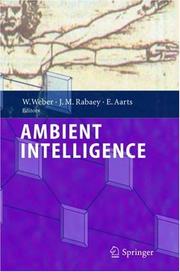
ISBN: 3540238670 9783540238676 3642062814 9786610337903 1280337907 3540271392 Year: 2005 Publisher: Berlin, Heidelberg : Springer Berlin Heidelberg : Imprint: Springer,
Abstract | Keywords | Export | Availability | Bookmark
 Loading...
Loading...Choose an application
- Reference Manager
- EndNote
- RefWorks (Direct export to RefWorks)
Ambient intelligence is the vision of a technology that will become invisibly embedded in our natural surroundings, present whenever we need it, enabled by simple and effortless interactions, attuned to all our senses, adaptive to users and context-sensitive, and autonomous. High-quality information access and personalized content must be available to everybody, anywhere, and at any time. This book addresses ambient intelligence used to support human contacts and accompany an individual's path through the complicated modern world. From the technical standpoint, distributed electronic intelligence is addressed as hardware vanishing into the background. Devices used for ambient intelligence are small, low-power, low weight, and (very importantly) low-cost; they collaborate or interact with each other; and they are redundant and error-tolerant. This means that the failure of one device will not cause failure of the whole system. Since wired connections often do not exist, radio methods will play an important role for data transfer. This book addresses various aspects of ambient intelligence, from applications that are imminent since they use essentially existing technologies, to ambitious ideas whose realization is still far away, due to major unsolved technical challenges.
Telecommunication technology --- Philosophy and psychology of culture --- Mass communications --- Ubiquitous computing --- Sensor networks --- Computer networks --- Telecommunication --- Informatique omniprésente --- Réseaux de capteurs --- Réseaux d'ordinateurs --- Télécommunications --- Social aspects --- Aspect social --- Solitons. --- Ubiquitous computing. --- Engineering & Applied Sciences --- Computer Science --- Sensor networks. --- Social aspects. --- Society and telecommunication --- Networks, Sensor --- Pervasive computing --- UbiComp (Computer science) --- Engineering. --- User interfaces (Computer systems). --- Artificial intelligence. --- Complexity, Computational. --- Electronics. --- Microelectronics. --- Optical materials. --- Electronic materials. --- Nanotechnology. --- Complexity. --- Optical and Electronic Materials. --- User Interfaces and Human Computer Interaction. --- Electronics and Microelectronics, Instrumentation. --- Artificial Intelligence (incl. Robotics). --- Molecular technology --- Nanoscale technology --- High technology --- Electronic materials --- Optics --- Materials --- Microminiature electronic equipment --- Microminiaturization (Electronics) --- Electronics --- Microtechnology --- Semiconductors --- Miniature electronic equipment --- Electrical engineering --- Physical sciences --- Complexity, Computational --- Electronic data processing --- Machine theory --- AI (Artificial intelligence) --- Artificial thinking --- Electronic brains --- Intellectronics --- Intelligence, Artificial --- Intelligent machines --- Machine intelligence --- Thinking, Artificial --- Bionics --- Cognitive science --- Digital computer simulation --- Logic machines --- Self-organizing systems --- Simulation methods --- Fifth generation computers --- Neural computers --- Interfaces, User (Computer systems) --- Human-machine systems --- Human-computer interaction --- Construction --- Industrial arts --- Technology --- Embedded computer systems --- Detectors --- Context-aware computing --- Multisensor data fusion --- Distributed processing --- Computer science. --- Artificial Intelligence. --- Informatics --- Science --- Computational complexity.
| Listing 1 - 5 of 5 |
Sort by
|

 Search
Search Feedback
Feedback About
About Help
Help News
News